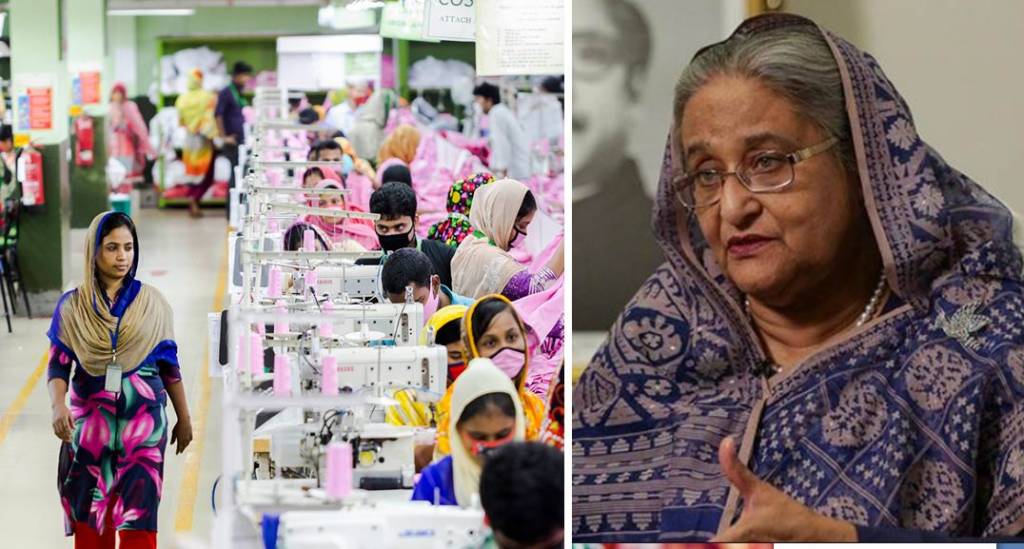Bangladesh is known to be one of the biggest manufacturing hubs of global textile brands, which depend upon the 4.2 million workers-strong textile industry of the South Asian country to deliver quality products for some of the biggest known garment brands in the world. The COVID-19 pandemic, however, has spelt a death knell for this industry in Bangladesh.
Bangladesh attracts major clothing companies for the cheap labour that is provided for, and also for the quality that is guaranteed. Bangladesh’s garment industry alone contributes close to 80% of the country’s total exports. Further, it is the second-largest manufacturing hub of textiles in the world, only next to China. The textile industry of Bangladesh alone contributes about 16% to the densely populated country’s GDP.
With the COVID-19 pandemic bringing the world to a standstill, the otherwise bustling textile industry of Bangladesh has been haemorrhaged like never before. Apparel brands and retailers have cancelled orders worth approximately $3.17 billion, pushing the textile industry of Bangladesh towards a hurtful collapse. It is to be noted that all the risks of the transaction are taken by the manufacturers themselves, as the apparel brands reimburse them only after accepting delivery of the products. As such, the manufacturers have borne all the costs of what are now canceled orders worth billions.
Mass layoffs have been witnessed ever since the global lockdown kicked in. The workforce is being laid off by employers in complete violation of laws, which mandate all labour, which has worked for an employer for a year or more, to be entitled to a three-month send-off pay. Many are not being paid at all, while some are getting a month’s worth salary, without any overtime pay which they might have earned. The millions of factory workers aren’t the only ones at risk, either. Around 15 million jobs in the country are reliant on the industry, directly or indirectly, according to the Bangladesh Commerce Ministry.
Bangladesh has lost around $1.5 billion so far, which has impacted some 1.2 million workers, according to Rubana Huq, president of Bangladesh’s Garment Exporters and Manufacturers Association (BGMEA). Huq has been at the forefront, ensuring minimum justice be delivered to a workforce of millions which has been left high and dry. Estimates suggest that Bangladeshi factories are losing $100 million with each passing day.
“As per the latest report at BGMEA, 1025 factories reported 864.17 million pieces worth $2.81 billion export cancelled… With so many orders cancelled and on hold and with no visibility of any confirmed direction, we are at a complete loss at this moment,” she further stated.
While the government of Bangladesh has rolled out a stimulus package for the industries worth close to $8.5 billion, many are sceptical as to what it would do to save a nose-diving industry of Textiles. Further, how the benefits of the same would be distributed to those at the bottom of the food chain, who are facing the maximum brunt of the pandemic is not known, as many have no bank accounts and have already been laid off.
Meanwhile, while many of the global brands are not fulfilling the terms of their contracts with the manufacturers, a few, like H&M, Adidas, Walmart, Zara, Mark’s and Spencer’s, and Primark say that they will be paying for orders they placed recently. The others have simply cancelled their orders unceremoniously, and are even refusing to accept deliveries of garments which have already been shipped.
“We urge brands to pay the cost of manufacturing for the goods we have confirmed order for and we have imported fabrics for those but did not start production yet. When the situation improves we can reciprocate to our valued customers to the best possible extent,” said a hopeful Rubana Huq
Such behaviour on the part of textile goliaths is simply qualifying for business done in bad faith, with absolute disregard towards the workforce which for so many years has been helping them to mint immense profits. Again, even if they do agree to fulfill their contractual commitments, there is no guarantee that a large workforce that has already been laid off by manufacturers will be given the monetary benefits which they so desperately require.
Bangladesh has a world-renowned textile industry footprint. The current pandemic is threatening the very existence of this industry, and if the situation globally does not improve soon, the industry might never be able to resuscitate itself. As such, it becomes a moral obligation on the part of major garment companies to bail out the collapsing industry. Otherwise, there may not be a manufacturing market available for them after this is all over.
